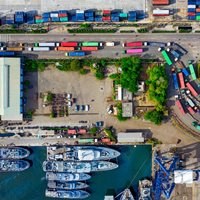(BRUSSELS) – A major reform of the EU’s Customs Union, announced Wednesday by the European Commission, will introduce more modern and efficient customs procedures and target e-commerce and illicit trade online.
The measures proposed present a world-leading, data-driven vision for EU Customs, says the Commission, which will ‘massively simplify customs processes for business, especially for the most trustworthy traders’.
“The tool will speed up trade flows and support our economic recovery,” said Commissioner Paolo Gentiloni: “This far-reaching reform will reduce red tape and compliance costs for businesses, create more transparency and certainty for EU citizens when shopping online, and introduce simpler and innovative processes for the authorities.”
The Commission says the reform will cut down on cumbersome customs procedures, replacing traditional declarations with a smarter, data-led approach to import supervision. At the same time, customs authorities will have the tools and resources they need to properly assess and stop imports which pose real risks to the EU, its citizens and its economy.
The reform responds to current pressures under which EU Customs operates, including a huge increase in trade volumes, especially in e-commerce, a fast-growing number of EU standards that must be checked at the border, and shifting geopolitical realities and crises. It simplifies and rationalises customs reporting requirements for traders, for example by reducing the time needed to complete import processes and by providing one single EU interface and facilitating data re-use. In this way, it helps deliver on President von der Leyen’s aim to reduce such burdens by 25%, without undermining the related policy objectives.
A new EU Customs Authority will oversee an EU Customs Data Hub which will act as the engine of the new system. Over time, the Data Hub will replace the existing customs IT infrastructure in EU Member States, saving them up to 2 billion a year in operating costs. The new Authority will also help deliver on an improved EU approach to risk management and customs checks.
A new EU Customs Data Hub will compile the data provided by business and via machine learning, artificial intelligence and human intervention provide authorities with a 360-degree overview of supply chains and the movement of goods.
Businesses will only need to interact with one single portal when submitting their customs information and will only have to submit data once for multiple consignments. In some cases where business processes and supply chains are completely transparent, the most trusted traders (‘Trust and Check’ traders) will be able to release their goods into circulation into the EU without any active customs intervention at all. The Trust & Check category strengthens the already existing Authorised Economic Operators (AEO) programme for trusted traders.
The EU Customs Data Hub, due to open for e-commerce consignments in 2028, will allow goods to be imported into the EU with minimum customs intervention, without compromising on safety, security or anti-fraud requirements.
Information and expertise will be pooled and assessed at EU level via the new EU Customs Authority acting on the data provided through the EU Customs Data Hub. The new regime is expected to substantially improve cooperation between customs and market surveillance and law enforcement authorities at EU and national level, including through information sharing via the Customs Data Hub.
Regarding e-commerce, online platforms will become the key actors in ensuring that goods sold online into the EU comply with all customs obligations.
Platforms will be responsible for ensuring that customs duties and VAT are paid at purchase, so consumers will no longer be hit with hidden charges or unexpected paperwork when the parcel arrives. With online platforms as the official importers, EU consumers can be reassured that all duties have been paid and that their purchases are safe and in line with EU environmental, safety and ethical standards.
At the same time, the reform abolishes the current threshold whereby goods valued at less than 150 are exempt from customs duty, which is heavily exploited by fraudsters. Up to 65% of such parcels entering the EU are currently undervalued, to avoid customs duties on import.
The new e-commerce regime is expected to bring additional customs revenues to the tune of 1 billion per year.
EU Customs Reform - guide
EU Customs Reform webpage on DG TAXUD’s website, including the Communication and legislative texts



